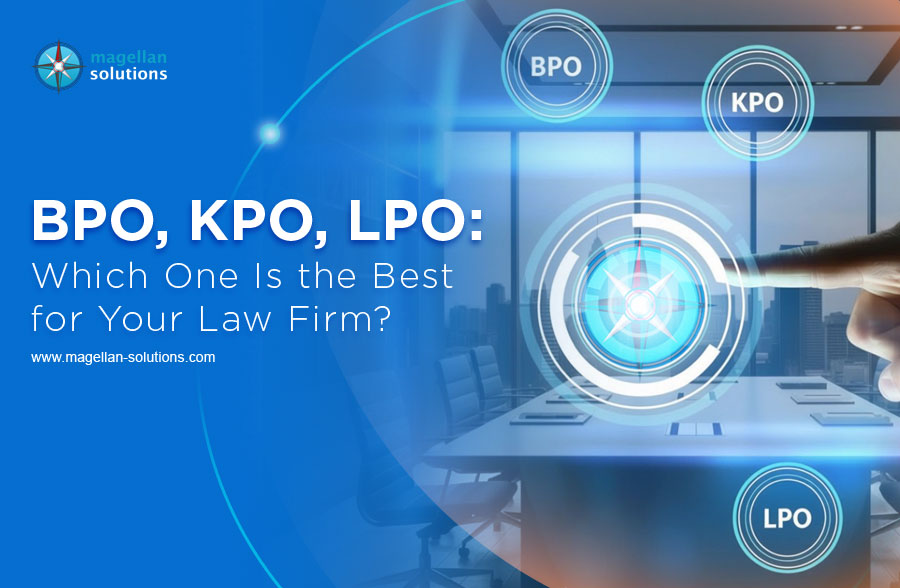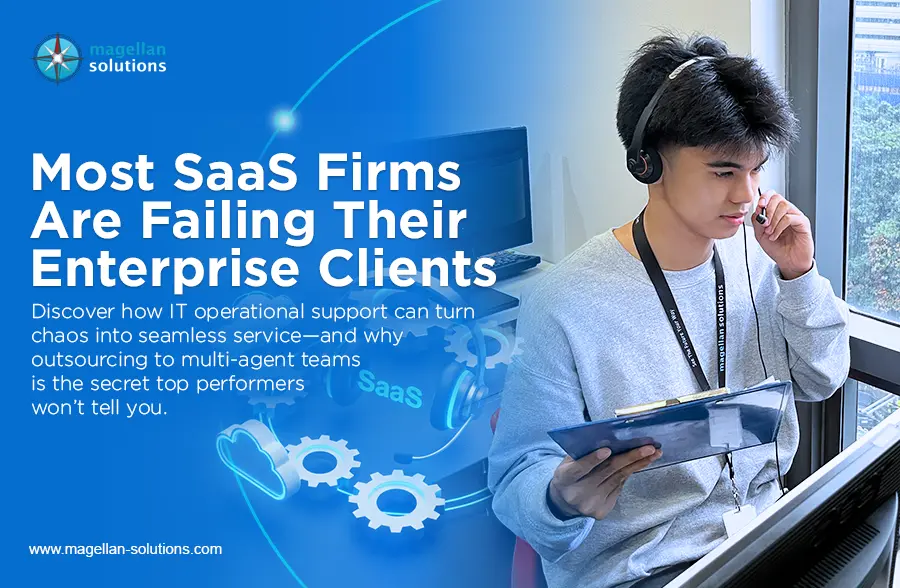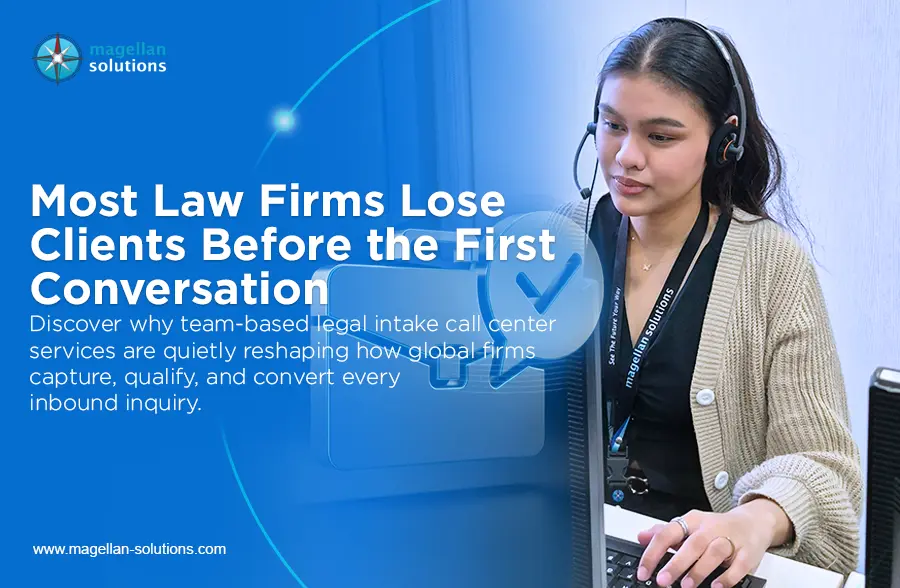Schedule a FREE call with our outsourcing expert now and get a precise quotation that meets your requirements. Don't wait - get started today!
Are you thinking of outsourcing some of the tasks in your law firm? If so, you have made a wise decision. However, the global outsourcing industry is vast. It can be tricky to choose which service provider is best for you.
During your search, you might have encountered acronyms for different types of outsourcing, such as BPO, KPO, and LPO. But what exactly do they mean? And how do you choose among them? Worry not, because we can explain that to you.
The Historical Context: From BPO to Specialized Outsourcing
Over the past few decades, the outsourcing industry has undergone massive evolution. The earlier phase was fueled by Business Process Outsourcing (BPO) where companies sought primarily to cut costs by delegating routine, non-core tasks to external service providers.
Then businesses that wished to derive more strategic advantage from outsourcing gave rise to Knowledge Process Outsourcing (KPO), which focused on information-driven processes and required a higher degree of skill and knowledge.
A more specialized form of outsourcing, Legal Process Outsourcing (LPO), then entered the scene that catered exclusively to the legal sector with bespoke services. From BPO to KPO and LPO, too, was therefore the journey of the industry’s evolution away from cost savings into adding more value and the direction of strategic partnership.
What is BPO?
BPO stands for business process outsourcing. Businesses use this to hire third-party service providers to handle non-primary processes.
In BPO, you can outsource a wide range of tasks. Service providers can cover different processes, including call center services. This includes call center services, human resource services, and IT services.
Also, this kind of outsourcing can cater to almost any business model and industry. Some even consider it an umbrella term for all types of outsourcing.
What is KPO?
Compared to BPO, KPO is more targeted and specific. Knowledge process outsourcing, as the term suggests, deals with knowledge based information-related functions. Unlike BPO, however, KPO aims to take on the core tasks of a business.
KPO services are often sorted into the following categories:
- Market research: also called business research. This service deals with gathering information on what consumers would buy. It also doubles as a strategy consulting service.
- Data management: the data management process covers several business operations. It involves gathering, storing, organizing, and maintaining data for an organization.
- Data analytics: the primary purpose is to provide insight into business strategies. It processes information to reveal metrics and trends that can guide your business.
- Performance management: used to ensure that the organization is meeting its goals. Performance management helps determine the points you need to improve to boost your productivity.
Since this type of outsourcing is highly specialized, not everyone can do it. Individuals who perform KPO services tend to have advanced degrees in specific fields.
KPO: A Versatile Solution Across Industries
A wide range of services are tailored to the unique needs of specific industries with Knowledge Process Outsourcing (KPO). Services like:
- Finance: Companies make informed decisions with financial analysis and investment research.
- Healthcare: Patient outcomes are improved by medical research and clinical trial data management accelerating innovation.
- Technology: Technological advancements and operational efficiency are driven by software development and IT consulting services.
A powerful blend of specialized knowledge and expertise means KPO supports core business strategies, as these examples illustrate.
What is LPO?
Legal process outsourcing (LPO) is exclusively made for the legal industry. Among the three, it is the only industry-specific outsourcing type. It mainly covers the non-core operations of a law firm.
Individuals and companies who offer this service should be knowledgeable about legal processes. The service providers are often paralegals, attorneys, or anyone familiar with the law.
Some LPO services may also fall under BPO or KPO. For example, a legal intake answering service is a BPO and LPO service. And legal research or e-discovery is also a KPO service.
LPO: Balancing Benefits and Considerations
Legal Process Outsourcing (LPO) offers many software benefits, such as cost-cutting by off-loading work to an LPO that specializes in it, providing access to specialized legal capabilities, and offering scalability.
There are challenges too, though. Chief among them is maintaining the security of your firm’s and client’s data and making sure the quality of the work done in the LPO meets your standards. However, these risks can be overcome.
There are numerous LPOs out there with well-established records and airtight security measures in place. The key is to carefully select the one that best fits your firm’s and your client’s needs.
Which type of outsourcing is most ideal for legal practices?
When shopping for clothes, wouldn’t you want the ones that fit you best? The same principle applies to outsourcing. You would like services that are tailor-made for your firm, and LPO is just that.
Yet it doesn’t mean your law firm can’t use BPO or KPO. As a business that deals with information, you might still need other outsourcing services.
So, when looking for an outsourcing partner, it is best not to discount BPO and KPO providers. Better yet, look for a well-rounded company offering all three outsourcing services.
How Can Legal Process Outsourcing Help Your Law Firm?
The LPO industry aims to help and support legal practices. As such, it offers plenty of benefits to your firm. Here are some of them:
- More time for core activities: legal work is much more than research, phone answering, or transcribing interviews. LPO providers are here to do those non-essential work so that you can focus on core activities.
- Reduce costs: it’s not easy to hire and train new employees, and it’s not cheap either. With legal outsourcing, you can expand your staff without paying onboarding costs.
- Improve client relationships: it’s easier to accommodate your clients when there is less work on your plate. LPO does not only reduce your workload — it can provide you with customer service experts, as well.
- Efficiently hire expert service: LPO providers are experts at what they do and are well-equipped for the job.—no need to spend a lot to hire and train experts. Also, you do not need to acquire new tools and equipment.
- Boost your growth: LPO is proven to boost the market growth of law firms. It improves client retention, revenue flow, and bottom-line growth.
Is it safe to offshore LPO?
Safety is a primary concern in offshore outsourcing. This is even more crucial in LPO because sensitive data is always involved. Despite this, it is safe to offshore LPO.
When done right, offshore outsourcing can even amplify your revenue. Some regions offer inexpensive outsourcing rates. If you outsource to these places, you will find that it costs much less than onshoring or nearshoring.
Also, the safety of LPO offshoring dramatically depends on your choices. For example, you might expose your data to security risks if you choose an unreliable service provider.
How do you choose the right service provider?
The global legal outsourcing market is significant and is still growing. Many service providers are out there, but not all fit your practice well.
So, to select the right LPO provider, you need to consider the following factors:
- Length of experience: choose a company that has been in the industry for a long time. They would know how to do their job efficiently. And they would have ample experience in dealing with different clients.
- Well-trained staff: the staff should be well-trained and knowledgeable in legal processes. The team should also receive regular training and assessment.
- Value for money: you need an outsourcing partner whose rates are within your budget. But, at the same time, they should still be able to provide high-quality services.
- Safety guarantee: this is the most crucial factor. You have to ensure that you outsource to an LPO provider who can protect your data. The best way to do this is to check for ISO certifications.
Navigating the Future: Trends Shaping Outsourcing
The outsourcing industry is at an inflection point, as it stagnates amidst fundamental shifts in the business and technology landscape:
- Artificial intelligence and machine learning are taking Knowledge Process Outsourcing to new heights, enabling predictive analytics, intelligent automation, and process mining.
- Virtual Legal Assistants and self-serve contracts are finally providing the productivity and client service uplift they promised a decade ago. This is great news for a sector that has been clinging to huge numbers of staff to get anything done. The days of those horrible billable hours are fast disappearing.
- “CyberSecurity Gold Rush” is now a cornerstone of BPO engagements, reflecting an increased focus on data protection and privacy. This is only set to intensify as BPO moves large workloads to the cloud and increasingly supports its clients’ customer engagement and digital process automation projects.
With so much changing so quickly, businesses need to understand these changes and factor them into their planning and approaches to outsourcing. The time is now to leverage BPO, KPO, and LPO’s potential as a strategic weapon to stay competitive.
Looking Ahead: The Strategic Value of Outsourcing
Looking ahead, the demand for specialized outsourcing services is only going to grow, driven in large part by the harsh realities of globalization and the boundless pace of technological change.
Increasingly, businesses will turn to outsourcing partners not just for cost reduction, but for strategic value — looking for partners who can offer innovation, adaptability, and the kind of specialized knowledge required to maneuver through the complex terrain of the global marketplace.
Outsourcing models like BPO, KPO, LPO, and RPO will continue to evolve, shaped in no small part by the sometimes uneasy dance of cost efficiency, specialized knowledge, and strategic partnership that prevails throughout the global business ecosystem.
A Leading Legal Process Outsourcing Service Provider in the Philippines
Are you looking to offshore your BPO, KPO, or LPO needs? Try outsourcing to the Philippines. The country is a central outsourcing hub for businesses around the world. Here, labor is sustainable, and the people are effective communicators, especially in English.
Magellan Solutions is one of the world’s leading LPO providers. We are an outsourcing company based in the Philippines and have been in the industry for over 18 years. Aside from legal outsourcing, our company offers many services, including BPO and KPO.
What to Expect From Magellan Solutions?
At Magellan Solutions, we ensure that our staff is ready for your law firm. We only hire highly skilled LPO staff with advanced training, education, and experience. We also monitor, evaluate, and train them regularly.
It is our goal to support growing businesses around the world. So, we offer flexible rates that are ideal for startups and SMEs. And we do this without sacrificing the quality of our services.
Magellan Solutions also has the ISO-27001 certification. This means that we have appropriate measures to handle your data and can assure you that any sensitive data about your law firm and clients will stay safe with us.
Are you ready to partner with us? Contact us today and discuss what we can do for your law firm.















